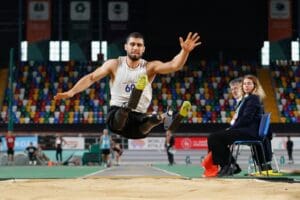
Imagine you need to build a team of 150 professionals from scratch, in a country where critical infrastructure isn’t finished, while the entire world prepares to watch.
You have officials from every continent speaking dozens of languages, three separate organizational bodies with competing priorities, and a construction site that should already be a world-class tennis venue. Welcome to Olympic officiating.
When Soeren Friemel arrived in Rio de Janeiro in December 2015 for his pre-Olympic site inspection as head of tennis officiating, he found a sobering reality: “Everything was in need of improvement.” Construction firms were changing, points of contact were unclear, and the timeline was unforgiving. Yet fourteen months later, the tennis competition would run flawlessly before a global audience. The journey from that chaotic December day to Olympic success reveals universal leadership lessons about building international teams, managing complexity, and protecting integrity under extreme pressure.
Building International Teams When Nothing Goes According to Plan
The scale of Olympic officiating coordination is staggering. For the 2016 Rio Games, over 700 officials applied from across the globe. The selection process required narrowing this pool to 110 individuals—50% Brazilian to leverage local knowledge, 50% international to bring diverse expertise. This wasn’t diversity as an abstract ideal; it was operational necessity. Tennis events at the Olympics span two weeks of continuous competition across multiple courts, requiring officials who understand not just the rules but the cultural nuances that prevent conflicts and build trust.
Each official selected represented more than technical competence. They needed language capabilities, cultural fluency, and the ability to integrate quickly with colleagues they’d never met. The coordination challenge extended far beyond the matches themselves. Soeren Friemel managed international travel logistics, coordinated accommodations across Rio’s sprawling geography, organized transportation to and from the Olympic Park, and created duty rosters that balanced workload with fairness. Some officials needed detailed routing assistance just to reach Brazil; others arrived with equipment challenges or last-minute questions about Olympic protocols.
The complexity multiplied when managing competing stakeholder interests. Olympic officiating operates at the intersection of three powerful institutions: the International Olympic Committee, the International Tennis Federation, and local organizing committees. Each brings legitimate priorities that don’t always align naturally. The IOC thinks universally across all Olympic sports, applying standards designed for swimming or track and field. The ITF understands tennis-specific requirements—that players spend entire days at the venue, not just brief competition windows. Local organizers face on-the-ground realities of infrastructure, security, and public expectations.
These groups, each with distinct priorities and institutional cultures, required careful coordination to align their objectives. Navigating this requires more than project management skills; it demands diplomatic finesse. You’re not simply coordinating people—you’re translating between institutional worldviews, finding compromise without sacrificing standards, and building consensus when time pressure makes patience difficult.
The crisis management challenge was equally demanding. That initial December site visit revealed construction delays, evolving plans, and uncertainty about when facilities would be ready. Building a tennis venue near swimming facilities in Barra Olympic Park meant coordinating with multiple construction teams, understanding interdependencies, and maintaining quality standards when contractors changed mid-project. The leadership principle that emerged: Don’t become discouraged by obstacles—become more deeply involved in solving them.
Perhaps most revealing about Olympic leadership is the 24/7 nature of the role. When you’re managing people from every timezone working in an unfamiliar environment, accessibility becomes currency. “People can come to me at 1:30 AM or 7:00 AM—my bus leaves at 7:30,” reflects the reality that building trust in high-pressure international teams requires being present when people need guidance. The goal isn’t just completing tasks; it’s creating systems resilient enough to function even when you’re not in the room. That resilience comes from relationships built through consistent availability and demonstrated commitment.
Protecting Integrity When National Pride and Pressure Collide
Olympic tennis carries unique pressure that distinguishes it from even Grand Slam tournaments. Athletes aren’t competing for themselves alone—they represent entire nations. Fans in the stands wave national flags. Media coverage emphasizes national medal counts. The temptation exists, subtle but real, to favor host country athletes or accommodate bigger names who generate more attention and revenue.
This is where systems protecting integrity become essential. Soeren Friemel emphasized that fairness must be structural, not dependent on individual virtue. Olympic tennis employs multiple officials per match—a minimum of eight for regulation play. This redundancy isn’t inefficiency; it’s intentional accountability. When several officials independently observe the same play, bias becomes harder to sustain. When protocols are clear and consistently applied, preferential treatment becomes visible.
The core principle: “It doesn’t matter if it’s the world number 1 or another player—you can’t let yourself be influenced.” This sounds straightforward until you’re making a call that disappoints an athlete carrying their nation’s hopes, or enforcing a rule that eliminates a marquee name from medal contention. The principle only becomes real when applied under conditions that make deviation tempting.
One controversial but visionary Olympic decision involved the IOC’s mandate for younger officials at Rio. Experience typically dominates officiating selections, but the mandate forced balance between seasoned judgment and fresh perspectives. The short-term trade-off was accepting less experience on some matches. The long-term gain was significant: officials trained at the Rio Olympics now work Grand Slams globally, their Olympic experience having accelerated development that might have taken years through traditional pathways.
This reflects broader thinking about talent development in high-stakes environments. Creating mentorship culture within teams, investing in next-generation capability even when experienced alternatives exist, and accepting that education sometimes requires real-stakes opportunities—these choices compound over time. The Olympic investment in younger officials didn’t just serve Rio; it elevated officiating quality globally for years following.
High-stakes moments tested these systems repeatedly. The Rafael Nadal versus Juan Martín del Potro semifinal represented exactly the scenario where bias could creep in—two beloved players, massive viewership, and intense emotional investment from fans. Ensuring fairness required vigilance across every official involved, clear communication about expectations, and confidence that the system would support correct but potentially unpopular decisions.
Players at this level often sought guidance directly, from Murray to Williams and others navigating the unique Olympic environment. Managing these interactions required balancing accessibility with appropriate boundaries. Being helpful without becoming partial. Answering legitimate questions while maintaining the professional distance that protects objectivity.
The broader lesson extends beyond sports. Any leader managing complex environments with multiple stakeholders faces similar challenges: maintaining integrity when pressure encourages compromise, building systems that make fairness structural rather than aspirational, and developing talent even when experience seems safer. Olympic officiating exemplifies these challenges in compressed, high-visibility form.
The Leadership That Endures
Olympic officiating reveals that leadership under scrutiny isn’t fundamentally about technical knowledge—though that’s essential. It’s about building diverse teams across cultural boundaries, managing stakeholder complexity without losing institutional mission, and protecting integrity through systems rather than rhetoric alone. When Soeren Friemel finished his Olympic responsibilities in Rio, he immediately began preparing officials for the US Open. The work never stops, but the principles remain constant.
For anyone leading in high-pressure environments, whether sports or business, these fundamentals translate: invest in people, build resilient systems, and never compromise on fairness. His approach to leadership, refined through decades of experience and shared through various insights, demonstrates that the podium may change, but the standards don’t.
Read more:
Soeren Friemel: Behind the Scenes of Olympic Officiating on the World Stage






